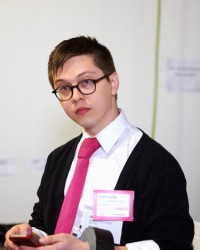
We here at Cyborgology recognize the extreme violence that has been done to the sincerity of birthdays. Facebook has hollowed out the intricate, cherished and beloved rituals of celebrating one’s birth and replaced them with virtual Starbucks gift cards and Pusheen stickers. We’ve taken the fake birthdays made up by journalists to heart and decided to celebrate the blog’s birthday (a day late, lol) with one really long post chock-a-block with announcements, retrospection, and nostalgia. So slow down, print out the post below, go to Cape Cod or somewhere that isn’t “online” and have a nice long read.
A note from Nathan Jurgenson and PJ Rey:
Four years ago, together, we launched a blog here at The Society Pages on technology and society. We pretty much just wanted to have fun with it, so we thought we’d name it something ridiculous–something that played on Donna Haraway’s classic conceptualization of the cyborg, which was at the root of our thinking and seemed to be missing in contemporary research. In four years, Cyborgology grew, added contributors, spun off the Theorizing the Web conference, and this blog has come to stand for a specific view of research and thinking about technology and society: one that understands them to be enmeshed; that rejects seeing the Internet as some separate, cyber, space; that speaks to broad publics; and that always takes into account social inequalities and vulnerabilities. We’re immensely proud of Cyborgology. We want nothing more than to see it stay energized and continue to grow. So, we have decided that, after four wonderful years, it is time for new leadership and fresh ideas. We are passing the blog over to long-time Cyborgologists David Banks and Jenny Davis, and we are excited to see what they’ll do running this show.
Happy birthday, Cyborgology. Take care of it, David and Jenny!
-Nathan & PJ
From the New Editors:
Hi, Cyborgology readers. Long time contributors David Banks and Jenny Davis here.
We are excited and humbled to take over editorship for the blog.
We want to take a moment to thank PJ and Nathan for creating this venue, which has thrived as a space for debate, critical thought, and the development of a theoretical perspective on technology in society. At the onset of the blog, Nathan and PJ wrote all of the content themselves, along with the tedious and technical work that goes on behind the scenes. They then grew the blog by carefully curating a team of ‘Cyborgologists,’ and working tirelessly to construct and maintain an intellectual community. We are all richer for their work.
David Banks became the first regular contributor, followed soon after by Jenny Davis. Here are our first ever posts (awww: David’s first post; Jenny’s first post). It has been an honor to write for PJ and Nathan, and to write with our fellow Cyborgologists, Sarah Wanenchak, Whitney Erin Boesel, Robin James, and Dave Paul Strohecker.
We have lots of new ideas for the future–including more guest posts, so start brainstorming your submissions. We are also committed to maintaining a tradition of rigorous, critical, and theoretically enriching writing and conversation.
Stick with us, there are big things to come.
-Jenny & David
Personal Messages from Cyborgologists
 Nathan- I started Cyborgology four years ago with PJ Rey, and today we’re handing it to long-time Cyborgologists David Banks and Jenny Davis. I’m very excited for the future of the blog and happy to reflect on the past year. Again, the blog has been a central part of the Theorizing the Web conference, and #TtW14 was my favorite yet. We saw the inclusion of Robin James whose brilliant work has made the blog even more fun to read. The one post of my own from the past year I’d like to highlight was a short reaction to a news story about Facebook throwing a sociology conference. Akin to what I’ve seen firsthand in academic department meetings and conferences as well as in governmental and corporate research groups, so-called “big” data swiftly passes right by basic methodological and ethical issues because the N is sooo biiiig. A sociology graduate student was quoted discussing how neutral Facebook is as a research environment and I responded with a post about this fallacy of neutrality. I was going to leave it there because this was a bad news story quoting a graduate student. I didn’t want to make too much fuss about knocking a straw-position, but I kept seeing this same fallacy even among professors as well as data journalists, corporate social media engineers, governmental research, and so on. The straw people were forming some kind of tragic majority, which lead to expanding that piece into a longer essay for The New Inquiry on “big” data as a special form of contemporary positivism. Hopefully the blog will continue to be a site for examining knowledge-power relations of the social web — and I know there’s a lot of exciting new changes in store for Cyborgology’s fifth year!
Nathan- I started Cyborgology four years ago with PJ Rey, and today we’re handing it to long-time Cyborgologists David Banks and Jenny Davis. I’m very excited for the future of the blog and happy to reflect on the past year. Again, the blog has been a central part of the Theorizing the Web conference, and #TtW14 was my favorite yet. We saw the inclusion of Robin James whose brilliant work has made the blog even more fun to read. The one post of my own from the past year I’d like to highlight was a short reaction to a news story about Facebook throwing a sociology conference. Akin to what I’ve seen firsthand in academic department meetings and conferences as well as in governmental and corporate research groups, so-called “big” data swiftly passes right by basic methodological and ethical issues because the N is sooo biiiig. A sociology graduate student was quoted discussing how neutral Facebook is as a research environment and I responded with a post about this fallacy of neutrality. I was going to leave it there because this was a bad news story quoting a graduate student. I didn’t want to make too much fuss about knocking a straw-position, but I kept seeing this same fallacy even among professors as well as data journalists, corporate social media engineers, governmental research, and so on. The straw people were forming some kind of tragic majority, which lead to expanding that piece into a longer essay for The New Inquiry on “big” data as a special form of contemporary positivism. Hopefully the blog will continue to be a site for examining knowledge-power relations of the social web — and I know there’s a lot of exciting new changes in store for Cyborgology’s fifth year!
 PJ- It’s hard to believe that over four years have passed since Nathan and I sat in our neighborhood bar in DC, spitballing silly names for a technology and society blog. It seems impossible to have imagined where this idea was headed and how profoundly it would shape our experience as a grad students. Cyborgology allowed us to start communicating with a wide range people who were excited to discuss the same sorts of questions that we were asking about technology and society, even as our own department proved unreceptive. I quickly realized that many of the most profound insights on these issues were not coming from the conventional academic sources that grad students are taught to rely on (though journal articles and conferences certainly have their place). Most important, Cyborgology has connected me to my fellow Cyborgologists, who have been an invaluable source of support, information, and ideas. I consider myself incredibly fortunate for this. I wish Jenny and David luck as they step into their new roles as our chief editors. I expect Cyborgology’s fifth year to be its best yet!
PJ- It’s hard to believe that over four years have passed since Nathan and I sat in our neighborhood bar in DC, spitballing silly names for a technology and society blog. It seems impossible to have imagined where this idea was headed and how profoundly it would shape our experience as a grad students. Cyborgology allowed us to start communicating with a wide range people who were excited to discuss the same sorts of questions that we were asking about technology and society, even as our own department proved unreceptive. I quickly realized that many of the most profound insights on these issues were not coming from the conventional academic sources that grad students are taught to rely on (though journal articles and conferences certainly have their place). Most important, Cyborgology has connected me to my fellow Cyborgologists, who have been an invaluable source of support, information, and ideas. I consider myself incredibly fortunate for this. I wish Jenny and David luck as they step into their new roles as our chief editors. I expect Cyborgology’s fifth year to be its best yet!
My favorite post this year, Sex Work and the Limits of American Libertarianism, called out Silicon Valley companies for using free market rhetoric to justify discriminatory actions (namely, limiting sex workers’ access to payment processing and crowd-funding sites). While sex workers are particularly stigmatized, and thus particularly vulnerable to discrimination, these incidents exemplify a system of surveillance, risk identification, and social exclusion that increasingly exerts control over all our lives. I will be thinking about this a lot as I write my dissertation over the next year.
 Jenny- I’m feeling pretty lucky that I got to spend another year blogging alongside, and exchanging gif-laden emails with, such a fantastic group of writers. Through the years, I’ve found that my favorite posts are the ones I never meant to write, but felt I had to write. This year, I wrote one such post, Digital Divide in Action: Lessons from a Canceled Flight, while sitting in an airport terminal, fueled by a few hours of sleep and lots of indignation. This post sticks out to me for its intersection of social theory and social justice, embedded in experience. The insistence upon combining social thought with social activism is a hallmark of Cyborgology, represented particularly well in numerous posts this year, such as Sarah Wanenchak’s critique of Apple’s Health app (along with a corpus of writing about gender and gaming), Robin James’ work on gender, capitalism, and ‘Lean In’ culture, and David Banks’ continued discussions of power and surveillance. Taking on a new editorial role this year, I hope to foster this kind of engagement among both regular contributors, and increasingly, guest bloggers. I look forward to bringing new voices into the mix and challenging myself, my fellow bloggers, and our readers, to contend with lines of thought we haven’t yet considered.
Jenny- I’m feeling pretty lucky that I got to spend another year blogging alongside, and exchanging gif-laden emails with, such a fantastic group of writers. Through the years, I’ve found that my favorite posts are the ones I never meant to write, but felt I had to write. This year, I wrote one such post, Digital Divide in Action: Lessons from a Canceled Flight, while sitting in an airport terminal, fueled by a few hours of sleep and lots of indignation. This post sticks out to me for its intersection of social theory and social justice, embedded in experience. The insistence upon combining social thought with social activism is a hallmark of Cyborgology, represented particularly well in numerous posts this year, such as Sarah Wanenchak’s critique of Apple’s Health app (along with a corpus of writing about gender and gaming), Robin James’ work on gender, capitalism, and ‘Lean In’ culture, and David Banks’ continued discussions of power and surveillance. Taking on a new editorial role this year, I hope to foster this kind of engagement among both regular contributors, and increasingly, guest bloggers. I look forward to bringing new voices into the mix and challenging myself, my fellow bloggers, and our readers, to contend with lines of thought we haven’t yet considered.
 David- This last year was a blast! I had a great time writing Modern Myths: Mundane Enchantment and Creating Ghosts and Enhance! Ugly Websites, Flip Phones, and the Trouble With Technology in Storytelling with Sarah. Fellow Cyborgolgists have also been tearing it up this year with Robin’s ongoing work on neoliberalism, Sarah’s gaming culture coverage, and Jenny’s insightful posts on her own rules for writing and researching. This has been a really productive year for me. My November essay Voting Reduces Diversity in Social Media Participation (Kinda) was the beginning of research that turned into my first New Inquiry essay which I was very proud of. I also really liked the conversations that formed around The Parable of the Coffee Maker and the Design Sir and my two essays (1 & 2) about wearables. My favorite essay of the year though has to be Open (Source) for Business. That essay came out of some serious frustrations with my own dissertation research, where I am constantly working with open source software and hardware that can be maddeningly buggy or confusing. I certainly agree with and support the philosophy of free software but the execution (even in my own work) almost always falls short for common users. It’s a sticky problem that I see myself returning to in the coming year. I also want to play with the form of posts more, perhaps returning to the style that I experimented with in Time Traveling in Troy, New York. I’ve been really inspired by my fellow Cyborgologists to experiment and push the limits of my writing and I hope that as I take on a more editorial role, I can spend more time playing with form as well as content. I’m immeasurably excited to be taking on this new role and working with my fiends for another year. Finally, in case anyone was wondering, I’m still waiting to hear back about my application for the #AmtrakResidency.
David- This last year was a blast! I had a great time writing Modern Myths: Mundane Enchantment and Creating Ghosts and Enhance! Ugly Websites, Flip Phones, and the Trouble With Technology in Storytelling with Sarah. Fellow Cyborgolgists have also been tearing it up this year with Robin’s ongoing work on neoliberalism, Sarah’s gaming culture coverage, and Jenny’s insightful posts on her own rules for writing and researching. This has been a really productive year for me. My November essay Voting Reduces Diversity in Social Media Participation (Kinda) was the beginning of research that turned into my first New Inquiry essay which I was very proud of. I also really liked the conversations that formed around The Parable of the Coffee Maker and the Design Sir and my two essays (1 & 2) about wearables. My favorite essay of the year though has to be Open (Source) for Business. That essay came out of some serious frustrations with my own dissertation research, where I am constantly working with open source software and hardware that can be maddeningly buggy or confusing. I certainly agree with and support the philosophy of free software but the execution (even in my own work) almost always falls short for common users. It’s a sticky problem that I see myself returning to in the coming year. I also want to play with the form of posts more, perhaps returning to the style that I experimented with in Time Traveling in Troy, New York. I’ve been really inspired by my fellow Cyborgologists to experiment and push the limits of my writing and I hope that as I take on a more editorial role, I can spend more time playing with form as well as content. I’m immeasurably excited to be taking on this new role and working with my fiends for another year. Finally, in case anyone was wondering, I’m still waiting to hear back about my application for the #AmtrakResidency.
 Sarah- This last year has been marked by a great deal of transition and reexamination – with my career, with where I live, with what I do and what I want and what truly matters to me. I think my writing here has been a reflection of that, and part of the process for me has been learning to be comfortable with letting more and more of it show – or at least learning to be comfortable with the discomfort. Probably one of the posts that stands out the most to me is “Gravitational Lensing: death, twitter, and (not) making sense of it all“. It was written shortly after my cousin’s sudden and unexpected death from suicide, and is an example of the kind of painful, raw, messy place to which I’d like to have the courage to go more often. It was a revelation for me, before even this last year, that I could write emotion into theory, that I could be sad and angry and passionate and it wouldn’t detract from the quality of what I produced. One of the most damaging things that academia can do, I think, is teach you that powerful emotion is antithetical to good work. So I’ve been unlearning that, and in the coming year I want to keep unlearning. I want to be braver than I have been in terms of where I go and what I’m willing to write about, and I want to push the boundaries of what kind of writing appears here. I want to charge headlong into places I find frightening. I think that’s where some of the best work often comes from.
Sarah- This last year has been marked by a great deal of transition and reexamination – with my career, with where I live, with what I do and what I want and what truly matters to me. I think my writing here has been a reflection of that, and part of the process for me has been learning to be comfortable with letting more and more of it show – or at least learning to be comfortable with the discomfort. Probably one of the posts that stands out the most to me is “Gravitational Lensing: death, twitter, and (not) making sense of it all“. It was written shortly after my cousin’s sudden and unexpected death from suicide, and is an example of the kind of painful, raw, messy place to which I’d like to have the courage to go more often. It was a revelation for me, before even this last year, that I could write emotion into theory, that I could be sad and angry and passionate and it wouldn’t detract from the quality of what I produced. One of the most damaging things that academia can do, I think, is teach you that powerful emotion is antithetical to good work. So I’ve been unlearning that, and in the coming year I want to keep unlearning. I want to be braver than I have been in terms of where I go and what I’m willing to write about, and I want to push the boundaries of what kind of writing appears here. I want to charge headlong into places I find frightening. I think that’s where some of the best work often comes from.
 Robin- Two of my most successful posts this year were On Twitter’s Gender Metric & Femininity As Technology. When I wrote them, thought the argument I was making was so obvious that the posts were more or less filler (that is, they weren’t breaking any new ground, just me blabbing on when I couldn’t think of something more innovative to say). And was I wrong about that! So one thing I learned this year is that I’m a pretty bad judge of what people will find interesting.
Robin- Two of my most successful posts this year were On Twitter’s Gender Metric & Femininity As Technology. When I wrote them, thought the argument I was making was so obvious that the posts were more or less filler (that is, they weren’t breaking any new ground, just me blabbing on when I couldn’t think of something more innovative to say). And was I wrong about that! So one thing I learned this year is that I’m a pretty bad judge of what people will find interesting.
My favorite posts of the year were generally the ones about music and sound: A Culture of Moderation: or, no more messages from Satan, Coincidental Consumption & the Thinkpiece Economy, & Big Data & the Physics of Social Harmony. My favorite posts to write are the ones that begin as class discussion with my students; the posts are my attempt to follow up on the ideas and questions my students and I pursued together. For example, my summer 2014 class on Theories of Neoliberalism resulted in Social Media, Because Neoliberalism?, The Financialized Girl, Yo, It’s Communicative Capitalism, & An Attempt At A Precise & Substantive Definition of Neoliberalism. My students are amazingly smart and they push me to be a better thinker; these posts are evidence of that.
Reach Out And Touch…: On Audio Social Media is one post I wish more people would read…especially every time the “why is there no Instagram for sound?” question pops up (again). There, I argue that the reason it’s so hard to make an Instagram for sound is not so much about sound so much as it is about the kind of sociality that social media is designed to support.
I suspect that future posts will be related to both (a) the new book manuscript I’m writing, which is about the relationships among post-identity politics, big data, and neoliberal political economy, and (b) the classes I teach. This spring I’m set to teach Feminist Philosophy & a pop music appreciation class, so I bet there will be some posts stemming from class readings and discussions.
Most Viewed Posts Written This Year
- Femininity as a technology: some thoughts on hyper employment by Robin James
- The Coolest Thing About Online Dating Sites by Jenny Davis
- Apple’s Health App: Where’s the Power? by Sarah Wanenchak
- Causes and Consequences of the Duckface by Jenny Davis
- A Social Critique Without Social Science by David A Banks
- Autobiography Through Devices (Part 1) by David A Banks
- Don’t Say Seminal, It’s Sexist by Jenny Davis
- On Pharrell’s “Happy” by Robin James
- Toward a Drone Sexuality – Part 1: Knowledge and consent by Sarah Wanenchak
- An attempt at a precise & substantive definition of ‘neoliberalism,’ plus some thoughts on algorithms by Robin James




















